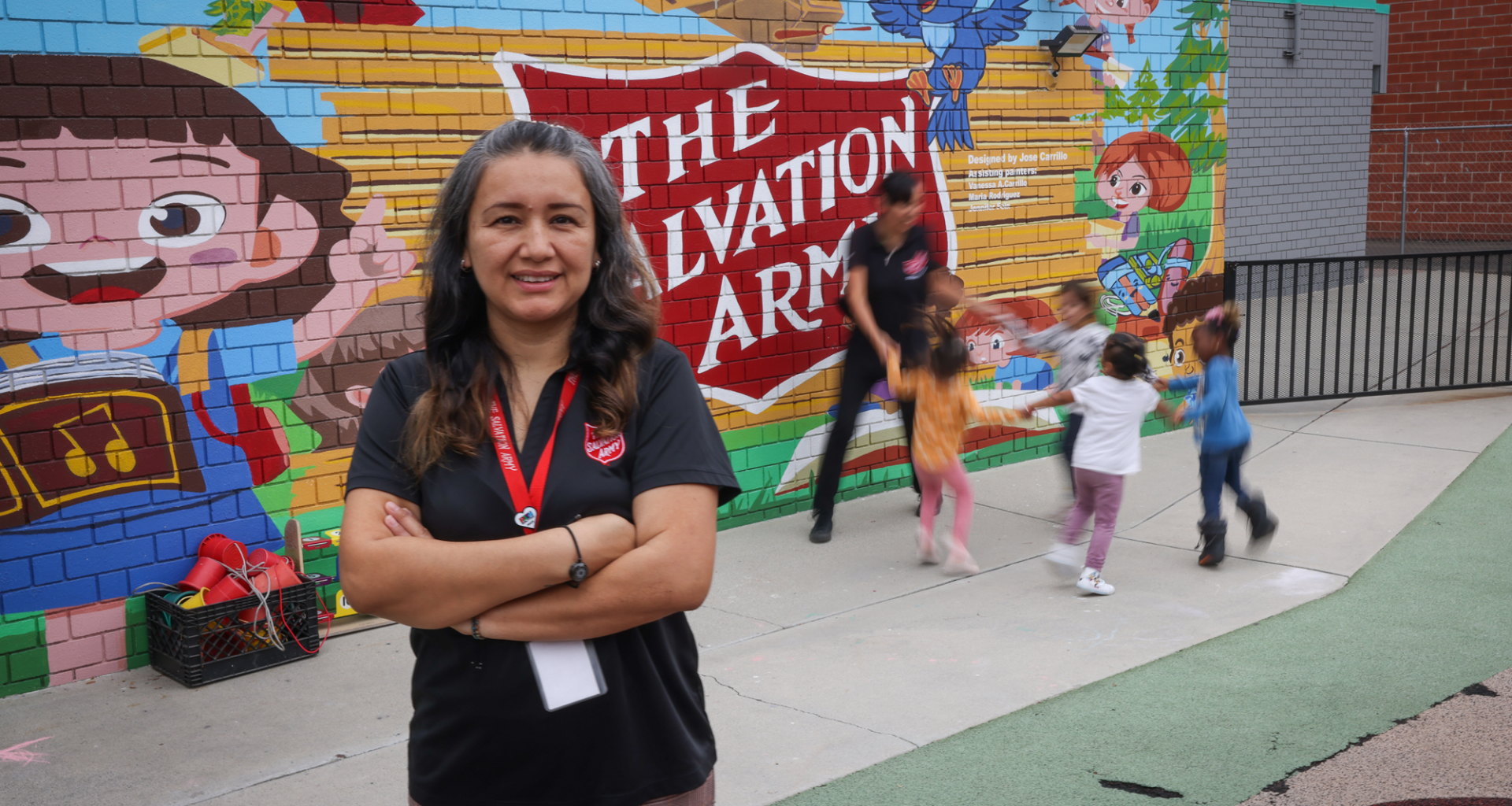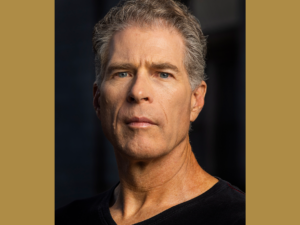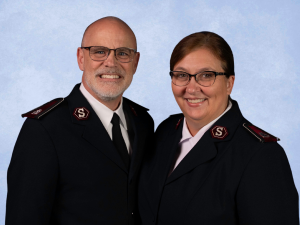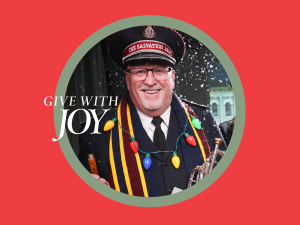I don’t think it’s going out on a limb to say every working parent’s biggest challenge is finding safe, affordable childcare.
As a mom to three myself, I’m excited to bring on Maria Rodriguez today.
Maria is the Director of The Salvation Army Los Angeles Day Care Center, where she has dedicated her entire career—31 years—to supporting the children of low-income families in LA’s fashion, produce, and flower districts.
Maria started here as a high school volunteer and simply never left, growing from a teenager helping out after school to leading a program that has been a lifeline for families since 1922.
In a time when nearly half of all parents report feeling completely overwhelmed by stress, and childcare costs have skyrocketed 26 percent in the last decade, The Salvation Army’s LA Day Care center represents something powerful: community-based care that supports entire families. We recently featured the day care center in our print magazine, themed “Hope in Action,” which you can find to read more about the center and see photos from inside at caringmagazine.org/hope.
Today, we’re going beyond that story to hear directly from Maria about what it’s like to be on the front lines of childcare, and how this center has become so much more than a place to drop off kids—it’s become the heart of a community where parents find peace of mind while they go to work but also give back as volunteers and leaders.
So allow me to introduce to you Maria Rodriguez, a woman who has spent three decades proving that when we invest in children and families, we build stronger communities for everyone.
Show highlights include:
- How Maria’s high school volunteer hours led to a lifelong career in early childhood education.
- What a “typical” day looks like inside a bustling urban daycare.
- The impact of serving families working in LA’s fashion, produce and flower districts.
- Stories of former students returning to enroll their own children.
- Why partnerships with organizations like Baby2Baby, UCLA and Cedars-Sinai matter.
- How a parent committee fosters true community ownership.
- Maria’s vision for the future of the center—and her call to action for anyone who wants to help.
Listen and subscribe to the Do Gooders Podcast now. Below is a transcript of the episode, edited for readability. For more information on the people and ideas in the episode, see the links at the bottom of this post.
* * *
Christin Thieme: Maria, you’ve been with this daycare center for 31 years, starting as I understand it, as a high school volunteer. So what drew you to doing this work and what made you decide to never leave?
Maria Rodriguez: Well, the first, what drew me first was, like you mentioned, during high school I had to do volunteering hours. My major was not child development. It was more archeologist. That was just a plan. It wasn’t a set stone. I had other plans in mind. It was a small moment. I remember my mom taking care of the neighbor kids all the time. I had to do community hours in high school, so I talked to the director that was from this location and she was also the daughter of a major part of the Salvation Army, so she’s like, “Oh, come over. Just try it out and see if you like it.” Oh, okay. Let me go over there and do some hours, community hours for school. And I started here in 1993.
She gave me the opportunity to do hours in this location. I remember helping in a classroom after school and watching child’s faces light up when they learn something new. The moment stayed with me. I realized how powerful it is to make a child feel safe, heard, and proud of themselves. I also saw how important it was for families to feel supported. When volunteering, I watched how much stress and strength family carried through the day. I wanted to be part of that solution to offer something stable, joyful, and meaningful during those early and critical years. Even though my plans were to be an archeologist because I love history, but now I’m making history with the families.
Christin Thieme: Yeah, definitely. Take us inside a day at the center. What’s it like there?
Maria Rodriguez: A typical day in the center, every day is filled with learning, laughter, support. Our goal is to create a safe and nurturing, stimulating environment for the kids so they could grow socially emotional and academically. Even though it’s not going to be a perfect day every day, but we’re there for support and guidance and we learn from them and they learn from us.
Christin Thieme: In our recent feature story about the LA Day Care, you mentioned wanting to make a difference in a child’s life. Some come from backgrounds that aren’t as safe, you said, so you’ve talked about why you started in this work and really that feeling of making sure kids feel safe and heard and understood. What keeps you motivated after decades of doing this?
Maria Rodriguez: After all these years in early childhood education, what keeping me going is simple. It’s just the families. Every day I witness moments of discovery, growth, joy through their eyes, as well as sadness. Whether it’s a child writing their name for the first time, learning how to share or finding their voice during circle time, those small wins light a fire in me and never goes out and never goes out. I’m most motivated by the relationships I build, not just with the children, but with the families. It reminds me that what we do extend far beyond the classroom.
Christin Thieme: The article, which by the way, I should mention, you can find at caringmagazine.org/hope so you can read the full feature about the LA Day Care, but it talks about how the center has been serving families in LA since 1922. What does it mean to you to be part of such a long legacy of community support?
Maria Rodriguez: Being part of a long legacy in this community support is more than just a role. It is a responsibility and a blessing. It means I’m walking through the footsteps of those who came before me, people who poured their time, energy, and love into uplifting others. It reminds me that I’m part of something bigger than myself. The legacy keeps me grounded.
Christin Thieme: You serve families primarily working in LA’s fashion, produce and flower districts. Many of them earn minimum wage or even less. How does that reality shape the way you approach your work each day?
Maria Rodriguez: By watching our families that work in LA district and the fashion district, the produce and the flower markets taught me more than just any textbook ever could. I saw early on what it means to wake up before the sun, to work with your hands, to pay attention to detail, and to take pride of every stitch, every box of fruit, every carefully arranged flower. Most of all, my family taught me that our work matters, even if it goes unseen. That reminds me daily that small efforts make a big difference, and the supporting one child or family is part of building something greater for the whole family.
Christin Thieme: The article mentions you’ve seen students return years later to enroll their own children. Can you tell us about one of those moments and what that’s like?
Maria Rodriguez: Yes, a good experience. One of the most touching moments of my career was a former student walked through our doors, not as a child, but as a parent, enrolling their own little one in our program. I recognized their face right away, and it was like time stood still to see someone I once guided, played with the toys and nurtured, now trusting me with their own child. It was overwhelming in the best way. It reminded me that work we do leave lasting impressions. We may not always see the impact right away, but it’s there growing quietly in the lives we touch.
Christin Thieme: Your center of partners with other organizations. I know there’s been partnerships with Baby to Baby, UCLA, Cedars-Sinai, all of which provide additional services to the families. How do you go about building these partnerships and why is this approach to serve the whole family so important?
Maria Rodriguez: Building relationship starts with trust, respect, and genuine care. I’m making a priority to truly listen, to hear what families, co-workers and community members need, value and hope for. Whether I’m speaking with a parent, a teacher, a local organization, I approach each relationship with empathy and open heart.
Christin Thieme: You also have a parent committee that seems to create a real community ownership of what happens there at the center. How did you go about developing this model of parent involvement?
Maria Rodriguez: It takes time, but creating a parent community, it wasn’t just about forming any other group, it’s about building trust, voice, and shared responsibility. I started by listening, I paid attention to what parents were saying during drop-off, pick-up, and family events. I noticed they had great ideas, concerns, and hopes for their children, but didn’t always have a space to share them.
From this, we created a welcoming space for parents to take ownership. We made sure the committee was not just for hearing updates, but for making real decisions. Whether it was planning events, giving feedback, classroom needs, or connecting families with outside resources, parents were part of the process. Overall, the parents’ committee grew into something special. Circle of share relationships, parent began leading projects, organizing events, and even mentoring new families. They started to see the daycare as theirs, not just a place to drop off their child.
Christin Thieme: There was a report not that long ago by the former Surgeon General that showed 48% of parents feel completely overwhelmed by stress in America. From your frontline perspective, working with parents day in and day out, how do you see this playing out in the families you serve?
Maria Rodriguez: Working closely with families over the years has been firsthand how stress shows up in many ways. Sometimes it’s subtle, a tired look at drop off, rushed goodbyes, or a parent quietly holding back tears. Other times its more visible like frustration, worried, or even guilt that they don’t do enough for their kids. I see parents carrying a weight of many responsibilities, working long hours with little pay, caring for multiple children or elderly relatives, facing housing or food insecurities, or navigating language or culture barriers. Many are simple trying to survive day-by-day, doing the best they can with limited support. That’s why our role is important by showing compassion, creating safe space, and offering support not just for the child, but for the whole family. We help listen to what they say and lighten their load.
Christin Thieme: What’s your vision for the future of the center?
Maria Rodriguez: Well, my dream for the future for our center is that it continues to be a place for every child to feel safe, seen, and valued. The second hope where learning is joyful, curiosity is nurtured, and each child’s culture and identity are celebrated. Most of all, I dream of a future where our center stands strong, not just to enroll their children, but to give back, mentor others, and keep the legacy alive. That is a future I hold close to my heart and I know step by step we are building it together.
Christin Thieme: Yeah, and the article in our recent print magazine really captures how it isn’t just a daycare, it’s a community center where, like you just said, everyone is in this together. If somebody wanted to support this effort or get involved in their own community in a similar way, what is something tangible that somebody listening could do this week?
Maria Rodriguez: Well, if they’re listening and wondering how they can help, know that there’s a place for you in this field. Supporting young children and family doesn’t always require a big title or a big budget, sometimes it starts with a simple showing up, and most importantly, advocate. Talk to your neighbors, talk to coworkers, to your local leaders about the need of affordable daycare, quality child care, speaking up for families, for teachers. Help us build a strong foundation for all children, because their future is our future. Together we can make a difference, and it starts with one step, one heart, and one helping hand.
Christin Thieme: Finally, Maria, what is giving you hope right now?
Maria Rodriguez: Hope is us educators being their support. Be here every day. I know there’s days that are hard times, but we’re still here, and so support our families. Without our support or any support of the community, our families can move on what they’re standing on. It’s just motivation. We see our families that struggle and stuff, but we’re here for them and for their kids.
Additional resources:
- If you are one of the hopefuls, get on the list for the Do Good Digest, our free 3-minute weekly email newsletter used by more than 20,000 hopefuls like you for a quick pick-me-up in a busy day.
- If you are enjoying this show and want to support it, leave a rating and review wherever you listen to help new listeners hit play for the first time with more confidence.
- If you want to help The Salvation Army serve more than 27 million Americans in need each year, give today. Your gift of money, goods or time helps The Salvation Army do good all year in your community.
Listen and subscribe to the Do Gooders Podcast now.












